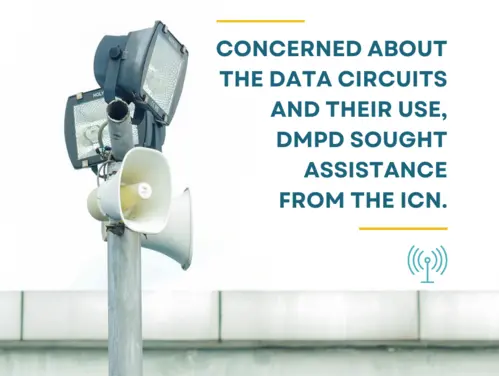ICN's network expertise and customer support were loud and clear when the DMPD needed assistance when the tornado sirens were in jeopardy.
The Radio Services Section within the Des Moines Police Department (DMPD) reached out to the ICN in early October when they received notice that their telecommunications provider was going to disconnect two data (T1) circuits on November 1. The existing provider was unwilling to extend additional time or help find a solution for the Des Moines Police Department.
Concerned about the circuits and their use, DMPD sought assistance from the ICN. Although ICN did not supply either of the circuits, we were prepared to help due to our continued partnership with the City of Des Moines (City) and our dedication to public safety.
After consultation with the ICN, DMPD requested data from the telecom provider, and received an invoice and circuit IDs. The data showed that one of the circuits was not active, requiring an easy disconnect order. The data regarding the second circuit indicated it to be operational (live). The City IT Department Networking Division tracked the circuit to the City Armory, and was able to determine the use from the DMPD radio shop to the 35th floor of the Ruan Building. The circuit in question is crucial for communications because it manages the signaling for the tornado sirens, also known as the Des Moines Civil Defense Sirens. If this circuit fails or is disconnected, the City will not be able to activate the tornado sirens in Des Moines among other critical communications.
When the purpose of the live circuit was discovered, ICN facilitated conversations with the City/DMPD and the telecom provider. After requesting and not receiving an alternative solution from the telecom provider, the City/DMPD asked the ICN how to proceed on October 17.
The issue the ICN faced was that we didn’t have fiber access to the Ruan Building's 35th floor, and the City was already using fiber into the building. ICN's Sales Engineer and Engineering team designed a solution to add two optical filters at specific access points along the fiber path. This would enable the City to continue to utilize the fiber, and add a channel for the ICN to access the fibers.
With 13 days remaining, the planned solution was deployed in the city parking garage and on the 35th floor of the Ruan building by the ICN and our managed network service provider, Fiber Network Services [FNS]. The work included moving the existing functioning City ethernet system to the newly installed fiber system and also installing and testing the ICN switch and optics on the open fiber optic channel.
ICN and FNS confirmed the T1 cabling and connections at the City Armory on October 30 and went over a plan to groom the radio equipment to the new ICN service. The last phase, which involved working with the DMPD radio team to move the city radio circuit to the ICN, was finished on October 31.
Our staff is aware of the importance of the communications that travel over the Network. Dave Lockard, Supervisor Des Moines Police Radio Services, explains that dedication, “The ICN staff were amazing with the research, design, and implementation of our new circuits within a very short window. They fully understood the impact to the public if these network transports were down and they came through with installation and testing before the old circuits went down. They worked very well with our radio services staff as well as the city networking engineer.”
As anticipated, on November 1, the telecom provider disconnected the second City circuit.
The City of Des Moines' tornado sirens are still operational and online because of the ICN's steadfast commitment to critical communications, as well as our dedication to service, network expertise, and customer support.

